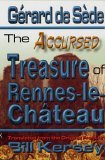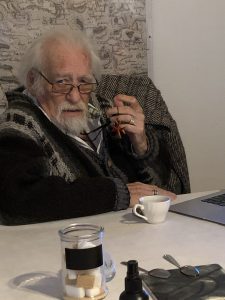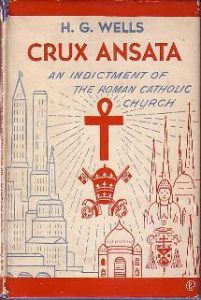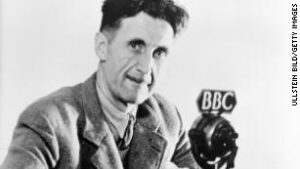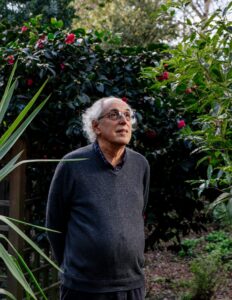Fairness Doctrine
Dayle in Limoux – Day #30
August 4, 2022As I prepare my next exploration, I found a great website in my research today written by Val Wineyard. https://marymagdalenebooks.blog4ever.com She lives in the Languedoc region and studies the history of all things Occitanie, including the Visigoths. She writes,
My previous life was of Visigothic descent. I decided to find out more about the Visigoths here in our region of Languedoc, the old Visigothic kingdom of Septimanie. I was so fascinated by this I wrote a book called ‘The Visigothic Inheritance’ and am now working on another, ‘Barbarian Gold.’ Recently I started a blog all about the Visigoths, these little known and badly judged people.
I had long been interested in Rennes-le-Château, deep in the hills to the south of Carcassonne, because it was founded by the Visigoths. As a mysterious centre it is endless – one mystery leads onto another; especially when you enter the church and see for yourself how the unusual priest loved Mary Magdalene. The whole village is devoted to her.
My conviction that the priest of Rennes-le-Chateau knew something that we didn’t about Mary Magdalene inspired me to write ‘Mary, Jesus and the Charismatic Priest’ and since then I just haven’t stopped writing about her, there is so much out there to know and learn and be fascinated and intrigued by. It has all snowballed. I do not, by the way, believe that she lived at Rennes-le-Château but at nearby Rennes-les-Bains.
Oui! These lands and villages hold particular intrigue for me, too. Deep mystery shrouded in tales of Templars, secret treasure, Roman Catholic Church popes and massacres, and the Good Christians, the Cathars. I am pulled to the places the author continuously writes about and researches. Recent inquiries have led me to a particularly harrowing historic event from 1163. More on that tomorrow.
To learn more about the sacred geometry I often reference, I’ve posted a short video from Sir Henry Lincoln, author of many books and investigations. The book you might be most familiar is The Holy Blood and the Holy Grail. It is this book that inspired Dan Brown’s The da Vinci Code. And Leonardo da Vinci lands prominently in the Cathar and Templar history. Sir Henry started his research in the ’70’s after finding an obscure little book he bought at a book shop for his French vacation.
This is a tale of the ancient treasures of the Visigoths. The late nineteenth century priest of Rennes-le-Chateau, Berenger Sauniere, supposedly uncovered this secret. According to the book he wants us to follow the clues he built into his domain as a legacy for the future. [Rennes-les-Chateau books]
It changed Sir Henry’s life. And mine.
Sir Henry Lincoln died on February 24th this year. Being back in this region, I think of him so much and wish deeply he was still with us. I have so many questions. He was made an honorary Knights Templar. I remember the day sitting around a table in Rennes-les-Bains when he reverently displayed his treasure.
I miss him. All I keep thinking is, ‘he knows.’
[You can find Sir Henry’s older BBC documentaries on his youtube channel, ‘Henry Speaks.’]
Fascinating find. Had no idea this book existed.
Crux Ansata, subtitled ‘An Indictment of the Roman Catholic Church’ by H.G. Wells, is a 96-page wartime book first published in 1943. Wells lived in London under the regular German Luftwaffe bombings from across the English Channel. He attacks Pope Pius XII and calls for the bombing of the city of Rome. And it’s also a hostile history of the Roman Catholic Church. Apparently Wells was an atheist and had a long history of anti-Catholic writings across many years.
Another spectacularly brilliant capture from the James Webb telescope.
NASA writes:
“A dramatic blade made of red gaseous wisps comes down top-to-bottom in the center of the image as smaller green wisps feather out in horizontal directions. A bright star shrouded in blue light is near the center of the bow-like blade. Blue dots in different sizes dot the background of the image, signifying neighboring stars.”
As Alex spews his hates and lies in a U.S. courtroom, reminded today we can draw a straight line from a moment in history to his deceptions and deep ugliness. Today is the anniversary of Reagan’s repeal of the Fairness Doctrine, the corner stone of my academic writing. Thank you for the reminder, Jon Meacham. It was on August 4th 1987 a decision was made that altered the trajectory of our news and information platforms, and landed the U.S. amidst false prophets, conspiracies, lies and polarization. January 6th doesn’t happen if Reagan left it alone. It’s how we got Rush and the state propaganda known as FOX. (Not news, just FOX.) Think of it like this using the medium of radio as an example. Radio stations no longer had to show both sides of a topic and conservatives quickly outpaced liberals. Cue Newt Gingrich, too, and his ‘Contract with America.’ After that, Rupert Murdoch, Roger Ailes, and the FOX brotherhood. Devastating decision, Ronnie.
Bonne Nuit.
❀
Re-visiting Fairness in Power for Attention
February 5, 2021During the Nixon administration in the 1970’s, the FCC called the Fairness Doctrine the “single most important requirement of operation in the public interest” (Becker, 2017, para. 8)
Becker, W. (2017, Feb. 23). What’s behind Trump’s war with the press? Huffpost.
Retrieved from https://www.huffingtonpost.com/entry/whats-behind-trumps-war-with-the-press_us_58addf5ce4b0598627a55f9e
Seth Godin:
The internet clearly has a trust problem. As with most things, it helps to start with the Grateful Dead.
After their incarnation as the Warlocks, they became more than a band. It was a family on the road. There were people who gave up their careers to follow them around, living on buses… they were seeing thirty or forty shows a year. You traded tickets, did favors, built relationships. People in the family knew that they’d be seeing each other again soon.
And then, in 1987, Touch of Grey went to #1 (their only top 40 hit) and it attracted a huge (and different) crowd to the shows. Reports were that the intimacy and trust disappeared.
Glen Weyl points out that the internet was started by three tribes, as different from each other as could be. The military was behind the original ARPA (and then DARPA) that built and funded it. Professors at universities around the world were among the early users. And in San Francisco, a group of ‘hippies’ were the builders of some of the first culture online.
Because each of these groups were high-trust communities, it was easy to conclude that the people they’d be engaging online would be too. And so, as the tools of the internet and then the web were built out, they forgot to build a trust layer. Plenty of ways to share files, search, browse, chat and talk, but no way to engage in the very complicated things that humans do around identity and trust.
Humans have been in tribal relationships since before recorded history began. The word “tribe” appears in the Bible more than 300 times. But the internet isn’t a community or a tribe. It’s simply a technology that amplifies some voices and some ideas. When we don’t know who these people are, or if they’re even people, trust erodes.
When a site decides to get big fast, they usually do it by creating a very easy way to join, and they create few barriers to a drive-by anonymous experience. And when they make a profit from this behavior, they do it more. In fact, they amplify it.
Which makes good business in the short run, but lousy public policy.
Twenty years ago, I wrote that if someone goes into a bank wearing a mask (current pandemic aside) we can assume that they’re not there to make a deposit.
And now we’re suffering from the very openness and ease of connection that the internet was built on. Because a collection of angry people talking past each other isn’t a community. Without persistence of presence, some sort of identity and a shared set of ideals, goals and consequences, humans aren’t particularly tempted to bring their best selves to the table.
The system is being architected against our best impulses. Humans understand that local leadership, sacrifice and generosity build community, and that fights and scandals simply create crowds. Countless people are showing up, leading and pushing back, but algorithms are powerful and resilient, and we need some of them to be rebuilt.
Until there’s a correlation between what’s popular or profitable and what’s useful, we’re all going to be paying the price.
Freedom Forum
Opinion by Nicole Hemmer
‘The Fairness Doctrine, a regulation from the late ‘40’s until 1987, dictated balanced coverage of controversial issues on broadcast radio and television. After its repeal, Rush Limbaugh & Fox News quickly became two of the most influential political institutions in the US.
George Orwell
Want to reinstate the FCC’s Fairness Doctrine to help curb the spread of disinformation? Conservatives and liberals both may well want to reconsider that idea, argues a Columbia University scholar.’
What America needs instead is a creative, comprehensive effort by both the private sector and the government to disincentivize conspiracies and misinformation on the many platforms on which they flourish. Some social media companies have begun this work, clearing out QAnon sites and banning some far-right and White power users and communities who pose a threat.That work needs to continue, with careful attention to the biggest offenders who game algorithms and media structures to spread misinformation. But sources of misinformation also need to be demonetized, whether they are YouTube channels or national cable networks, and algorithms tweaked to slow down the spread of extreme content.’
NYTimes
I Talked to the Cassandra of the Internet Age
The internet rewired our brains. He predicted it would.
Posted on twitter 2.4.21:
“I’m going to spend more time writing on this because this is not only a digital detox story. it’s a story about power. And it’s at the center of everything.”
“Michael Goldhaber is the internet prophet you’ve never heard of. Here’s a short list of things he saw coming: the complete dominance of the internet, increased shamelessness in politics, terrorists co-opting social media, the rise of reality television, personal websites, oversharing, personal essay, fandoms and online influencer culture — along with the near destruction of our ability to focus.
Most of this came to him in the mid-1980s, when Mr. Goldhaber, a former theoretical physicist, had a revelation. He was obsessed at the time with what he felt was an information glut — that there was simply more access to news, opinion and forms of entertainment than one could handle. His epiphany was this: One of the most finite resources in the world is human attention. To describe its scarcity, he latched onto what was then an obscure term, coined by a psychologist, Herbert A. Simon: “the attention economy.”
Advertising is part of the attention economy. So are journalism and politics and the streaming business and all the social media platforms. But for Mr. Goldhaber, the term was a bit less theoretical: Every single action we take — calling our grandparents, cleaning up the kitchen or, today, scrolling through our phones — is a transaction. We are taking what precious little attention we have and diverting it toward something. This is a zero-sum proposition, he realized. When you pay attention to one thing, you ignore something else.
The idea changed the way he saw the entire world, and it unsettled him deeply. “I kept thinking that attention is highly desirable and that those who want it tend to want as much as they can possibly get,” Mr. Goldhaber, 78, told me over a Zoom call last month after I tracked him down in Berkeley, Calif. He couldn’t shake the idea that this would cause a deepening inequality.
“When you have attention, you have power, and some people will try and succeed in getting huge amounts of attention, and they would not use it in equal or positive ways.”
More than a decade later, Mr. Goldhaber lives a quiet, mostly retired life. He has hardly any current online footprint, except for a Twitter account he mostly uses to occasionally share posts from politicians. I found him by calling his landline. But we are living in the world he sketched out long ago. Attention has always been currency, but as we’ve begun to live our lives increasingly online, it’s now the currency. Any discussion of power is now, ultimately, a conversation about attention and how we extract it, wield it, waste it, abuse it, sell it, lose it and profit from it.
While Mr. Goldhaber said he wanted to remain hopeful, he was deeply concerned about whether the attention economy and a healthy democracy can coexist. Nuanced policy discussions, he said, will almost certainly get simplified into “meaningless slogans” in order to travel farther online, and politicians will continue to stake out more extreme positions and commandeer news cycles. He said he worried that, as with Brexit, “Rational discussion of what people stand to gain or lose from policies will be drowned out by the loudest and most ridiculous.”
[Alex Kiesling]
Full article:

